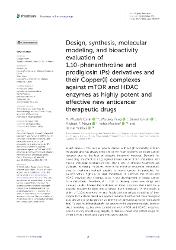| dc.contributor.author | Cetin, M. Mustafa | |
| dc.contributor.author | Peng, Wenjing | |
| dc.contributor.author | Unruh, Daniel | |
| dc.contributor.author | Mayer, Michael F. | |
| dc.contributor.author | Mechref, Yehia | |
| dc.contributor.author | Yelekci, Kemal | |
| dc.date.accessioned | 2023-10-19T15:11:46Z | |
| dc.date.available | 2023-10-19T15:11:46Z | |
| dc.date.issued | 2022 | |
| dc.identifier.issn | 1663-9812 | |
| dc.identifier.uri | https://doi.org/10.3389/fphar.2022.980479 | |
| dc.identifier.uri | https://hdl.handle.net/20.500.12469/5211 | |
| dc.description.abstract | Breast cancer is the second type of cancer with a high probability of brain metastasis and has always been one of the main problems of breast cancer research due to the lack of effective treatment methods. Demand for developing an effective drug against breast cancer brain metastasis and finding molecular mechanisms that play a role in effective treatment are gradually increasing. However, there is no effective anticancer therapeutic drug or treatment method specific to breast cancer, in particular, for patients with a high risk of brain metastases. It is known that mTOR and HDAC enzymes play essential roles in the development of breast cancer brain metastasis. Therefore, it is vital to develop some new drugs and conduct studies toward the inhibition of these enzymes that might be a possible solution to treat breast cancer brain metastasis. In this study, a series of 1,10-phenanthroline and Prodigiosin derivatives consisting of their copper(I) complexes have been synthesized and characterized. Their biological activities were tested in vitro on six different cell lines (including the normal cell line). To obtain additional parallel validations of the experimental data, some in silico modeling studies were carried out with mTOR and HDAC1 enzymes, which are very crucial drug targets, to discover novel and potent drugs for breast cancer and related brain metastases disease. | en_US |
| dc.description.sponsorship | National Science Foundation [CHE-0847736]; National Institutes of Health (NIH) [1R01GM112490-08, 1R01GM130091-03] | en_US |
| dc.description.sponsorship | Financial support from the National Science Foundation (MM research grant CHE-0847736) is gratefully acknowledged. This work was also supported by grants from National Institutes of Health (NIH, 1R01GM112490-08 and 1R01GM130091-03). | en_US |
| dc.language.iso | eng | en_US |
| dc.publisher | Frontiers Media Sa | en_US |
| dc.relation.ispartof | Frontiers in Pharmacology | en_US |
| dc.rights | info:eu-repo/semantics/openAccess | en_US |
| dc.subject | Schiff-Base-Copper | En_Us |
| dc.subject | Breast-Cancer Cells | En_Us |
| dc.subject | Histone Deacetylase-1 | En_Us |
| dc.subject | Proteasome Inhibitors | En_Us |
| dc.subject | Metal-Complexes | En_Us |
| dc.subject | Expression | En_Us |
| dc.subject | Apoptosis | En_Us |
| dc.subject | Ring | En_Us |
| dc.subject | Induction | En_Us |
| dc.subject | Prognosis | En_Us |
| dc.subject | breast cancer brain metastases | en_US |
| dc.subject | 1,10-phenanthroline | en_US |
| dc.subject | anticancer therapeutic drugs | en_US |
| dc.subject | mTOR | en_US |
| dc.subject | HDAC | en_US |
| dc.subject | HDAC1 | en_US |
| dc.subject | molecular modeling | en_US |
| dc.subject | prodigiosin | en_US |
| dc.title | Design, synthesis, molecular modeling, and bioactivity evaluation of 1,10-phenanthroline and prodigiosin (Ps) derivatives and their Copper(I) complexes against mTOR and HDAC enzymes as highly potent and effective new anticancer therapeutic drugs | en_US |
| dc.type | article | en_US |
| dc.authorid | Yelekci, Kemal/0000-0002-0052-4926 | |
| dc.authorid | Cetin, M. Mustafa/0000-0002-6443-0232 | |
| dc.identifier.volume | 13 | en_US |
| dc.department | N/A | en_US |
| dc.identifier.wos | WOS:000871099800001 | en_US |
| dc.identifier.doi | 10.3389/fphar.2022.980479 | en_US |
| dc.identifier.scopus | 2-s2.0-85140232268 | en_US |
| dc.institutionauthor | N/A | |
| dc.relation.publicationcategory | Makale - Uluslararası Hakemli Dergi - Kurum Öğretim Elemanı | en_US |
| dc.authorwosid | Unruh, Daniel/HGD-1250-2022 | |
| dc.authorwosid | Yelekci, Kemal/B-1431-2019 | |
| dc.identifier.pmid | 36267272 | en_US |
| dc.khas | 20231019-WoS | en_US |
















